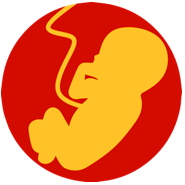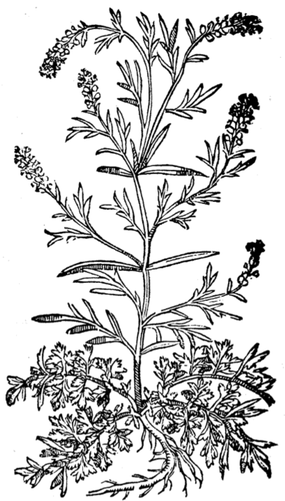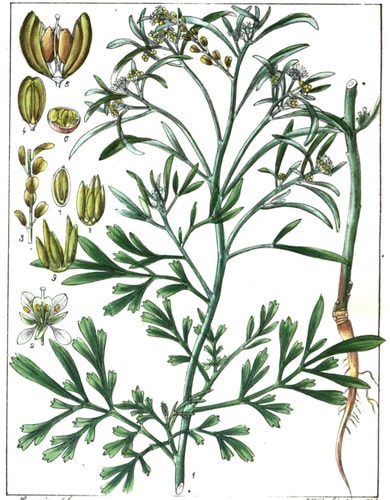|
Della Materia Medicinale, Andrea Valuassori, 1562
|
Illustrations of Indian Botany, Wight, 1840
|
Botanical name:
Lepidium sativum
Several related varieties are used similarly including L. latifolium (Pepperwort)
Lepidium apetalum is used similarly in TCM, and is found from Europe to Asia.
Parts used:
Leaf, Seed
Temperature & Taste:
Warm, dry. Pungent, Bitter
"Hot and Dry in the Third degree". (Avicenna)
Lepidium sativum
Several related varieties are used similarly including L. latifolium (Pepperwort)
Lepidium apetalum is used similarly in TCM, and is found from Europe to Asia.
Parts used:
Leaf, Seed
Temperature & Taste:
Warm, dry. Pungent, Bitter
"Hot and Dry in the Third degree". (Avicenna)
Uses:
1. Clears Wind and Cold, Stops Cough:
-Cough, Bronchitis, Asthma
-Cold and Flu.
-The related L. apetalum of TCM is used for Cough and Wheezing. (seeds)
-"cleanses the Lungs and cures Asthma". (Avicenna)
2. Warms the Stomach, Clears Cold and Phlegm:
-cold disorders of the Stomach and Digestion
-poor appetite, indigestion and nausea (seed powder is taken with sugar as a home remedy in India).
-Seeds are used for Hiccup, Diarrhea;
-seeds soothe internal inflammation of the mucus membranes of the Stomach and Intestines.
3. Warms and Strengthens the Kidneys:
-Aphrodisiac
-Premature Ejaculation in Unani.
-restorative to the Kidneys, and warms the Yang.
-Seeds are taken with sugar to increase Semen.
-Seed are used in various Unani formula as a Brain and Kidney tonic
-increase strength and improves Complexion (Unani)
4. Warms the Kidneys, Clears Damp, Promotes Urine:
-Urinary insufficiency, Dysuria associated with Cold and Damp.
-Lumbago and Rheumatic complaints associated with cold and weak Kidneys;
-Ayurvedic Pharmacopoeia of India recommends the powdered seeds for Gout.
5. Moves the Blood, Promotes Menstruation:
-promotes Menstruation when obstructed by cold; Amenorrhea, Dysmenorrhea, especially with lower back pain and coldness.
-Seeds decocted in Milk have been used to cause Abortion (Unani).
6. Promotes Milk (seed)
7. Kills Worms. (Avicenna)
8. Externally:
i. paste or mucilage of the seeds relieves Freckles, skin discoloration and Leucoderma.
ii. used internally and externally to promote Bone healing. (Unani)
iii. topically "with vinegar and barley flour is useful in Sciatica" (Avicenna)
iv. juice applied to hair roots strengthens hair and hinders baldness
v. "Its paint or oral intake stops Falling Hair". (Avicenna)
vi. "Garden cress is useful in the insects sting both when taken orally or plastered with honey". (Avicenna)
Dose:
"When taken in a dose of one iksonafin (12 gm), it expels Bile through vomiting or loose motion. Three fourth of a dirham (2.60 gm) is also quite enough to produce the same effect". (Avicenna)
Powder: 1–2 grams
Correctives:
1. Sugar
2. Cucumber seed (Unani)
3. Tragacanth
Substitute:
1. Mustard seed
2. "Its potency is similar to the potency of Mustard and Radish seeds taken together". (Avicenna)
3. "Some physicians believe that Mustard and Rocket seeds when taken together, become equal to its potency". (Avicenna)
4. Brassica juncea (Unani)
5. Allium ascalonicum (or Garlic)
6. Horehound, Dodder or Caraway (Unani)
"When taken in a dose of one iksonafin (12 gm), it expels Bile through vomiting or loose motion. Three fourth of a dirham (2.60 gm) is also quite enough to produce the same effect". (Avicenna)
Powder: 1–2 grams
Correctives:
1. Sugar
2. Cucumber seed (Unani)
3. Tragacanth
Substitute:
1. Mustard seed
2. "Its potency is similar to the potency of Mustard and Radish seeds taken together". (Avicenna)
3. "Some physicians believe that Mustard and Rocket seeds when taken together, become equal to its potency". (Avicenna)
4. Brassica juncea (Unani)
5. Allium ascalonicum (or Garlic)
6. Horehound, Dodder or Caraway (Unani)
Main Combinations:
1. Diarrhea, Dysentery, Colitis, Cress seed with Triphala, Cumin and Fennel seed (as in Electuary of Micleta)
Cautions:
1. Not used in Yin deficiency. Large doses or long-term use are said to be harmful for the Kidneys in Unani.
2. Avoid the seed in Pregnancy. Leaf can be used in moderation as food.
Main Preparations used:
1. Not used in Yin deficiency. Large doses or long-term use are said to be harmful for the Kidneys in Unani.
2. Avoid the seed in Pregnancy. Leaf can be used in moderation as food.
Main Preparations used:
Click the Tabs above for more information on this Medicine
|
'The common cress is generally supposed to be a native of Persia, from which country it was probably introduced at an early date into India. The seeds are called Chandrasura in Sanskrit works, and are described as tonic and alterative; water, thickened with the mucilage which they give out, is recommended in the Bhavaprakasa as a remedy for hiccup. The Mahometan writers identify cress with the [?} of the Greeks, and give Hab-el-Rashad as the
|
Arabic name for the seeds, which they consider to be hot and dry in the third degree, and to have aphrodisiac and diuretic properties; they recommend them for the dispersion of certain chronic enlargements of the spleen, &c, and as an alterative in various diseased conditions supposed to be produced by cold humors.' (Vegetable Materia Medica of Western India, Dymock, 1885)
|




